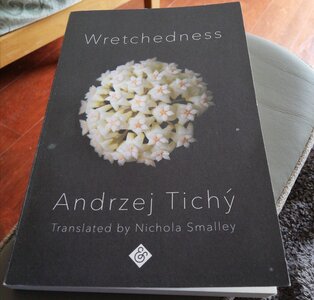With some books, the voice is key, and here’s one of them. The narrator of Wretchedness is a cellist living in Malmö. As the novel begins, he’s waiting by the canal for a couple of friends and colleagues, a guitarist and composer. He is approached by a homeless man who wants a smoke. As the cellist speaks to this man, he is reminded of his own past, the poverty he escaped. He realises that, if life had turned out differently, he could have been this guy.
The book then switches back and forth between the cellist’s past and present, contrasting the hard realities of his earlier life with his more abstract thoughts on music, in a torrent of language. Here he is, for example, discovering the freeing power of the radio:
…I listened and thought and listened and soon learnt to recognise the sounds I liked, the ones that sounded different to the ones I was used to, but also words and sounds that in different ways related to the life I recognised, the pain and the rage and the shame and the hate and the madness, like when I, at Eleonora’s place, got to hear Godflesh and Slayer for the first time, and at that point, as I listened, it was like my life got better, like it really, properly, got noticeably better just cos some guy had stood there yelling in a studio…
translation from swedish by nichola smalley
The dense, chapter-long paragraphs of Wretchedness suggest that maybe this man can’t outrun his past after all, because it’s so inextricably mixed up with his present thoughts. Whatever the case, this book is a vivid and powerful journey for the reader.
Published by And Other Stories.
Read my other posts on the 2021 International Booker Prize here.

Recent Comments